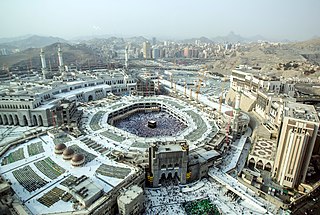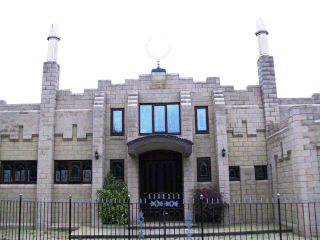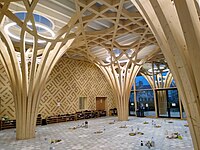A mosque or masjid is a place of prayer for Muslims. Mosques are usually covered buildings, but can be any place where prayers (salah) are performed, including outdoor courtyards.

The Id Kah Mosque is a historic mosque and tourist site located in Kashgar, Xinjiang, China.

The documented history of Islam in the Republic of Ireland dates back to the 1950s. The number of Muslims in the Republic of Ireland has increased since the 1990s, mostly through immigration. According to the 2022 Irish census, the number of Muslims resident in the Republic was 83,300.

Masjid-i-Jehan-Numa, commonly known as the Jama Masjid of Delhi, is one of the largest mosques in India.

The London Central Mosque is an Islamic place of worship located on the edge of Regent's Park in central London.

Islam is the second-largest religion in the United Kingdom, with results from the 2011 Census giving the population as 4.4% of the total UK population, while results from the 2021 Census recorded a population of 6.5% in England and Wales. London has the greatest population of Muslims in the country. The vast majority of Muslims in the United Kingdom adhere to Sunni Islam, while smaller numbers are associated with Shia Islam.

Timothy John Winter; 15 May 1960 is an English academic, theologian and Islamic scholar who is a proponent of Islamic neo-traditionalism. His work includes publications on Islamic theology, modernity, and Anglo-Muslim relations, and he has translated several Islamic texts.

The Baitul Futuh is a mosque complex of the Ahmadiyya Muslim Community, situated in Morden, London. It is one of the largest mosque complexes in Europe. Completed in 2003 at a cost of £15 million, entirely from donations of Ahmadi Muslims, the Mosque can accommodate a total of 13,000 worshippers. The main mosque has a height of 23m above ground, and to maximise capacity the building extends below ground. Baitul Futuh is located in the south-west London suburb London Borough of Merton. It is situated next to Morden South railway station, 0.4 miles from Morden Underground station and one mile from Morden Road tram stop.

Green Lane Masjid & Community Centre (GLMCC), is a mosque in Birmingham. It has been a registered charity in England since 2008. The Masjid occupies a prominent corner site in Green Lane, Small Heath, Birmingham.

The East London Mosque (ELM) is situated in the London Borough of Tower Hamlets between Whitechapel and Aldgate East. Combined with the adjoining London Muslim Centre and Maryam Centre, it is one of the largest mosques in Europe accommodating more than 7,000 worshippers for congregational prayers. The mosque was one of the first in the UK to be allowed to use loudspeakers to broadcast the adhan.

The Markazi Masjid, also known as the Dewsbury Markaz or Dar ul Ulum, is a mosque in the Savile Town area of Dewsbury, West Yorkshire, England.
There were 1,318,755 Muslims reported in the 2021 census in the Greater London area. In the 2021 census Office for National Statistics, the proportion of Muslims in London had risen to 15% of the population, making Islam the second largest religion in the city after Christianity.

Edinburgh Central Mosque is located on Potterrow near the University of Edinburgh central area and the National Museum of Scotland. The mosque and Islamic centre was designed by Dr. Basil Al Bayati, and took more than six years to complete at a cost of £3.5M. The main hall can hold over one thousand worshippers, with women praying on a balcony overlooking the hall. The mosque holds chandeliers and a vast carpet, with very little furniture.
The Inclusive Mosque Initiative (IMI) was founded in 2012, in London, UK. It is a grassroots activist organisation which works towards promoting the understanding of an intersectional feminist Islam. In practice, this means that IMI spaces and events are organised to be as inclusive as possible; unlike many existing mosques and religious organisations, IMI is not divided along linguistic, sectarian, political or ethnic lines. The organisation makes every effort towards providing disabled access to and within its venues, including British Sign Language (BSL) within its services, and giving translations of Arabic words when used.

Masjid al-Haram, also known as the Sacred Mosque or the Great Mosque of Mecca, is a mosque enclosing the vicinity of the Kaaba in Mecca, in the Mecca Province of Saudi Arabia. It is a site of pilgrimage in the Hajj, which every Muslim must do at least once in their lives if able, and is also the main phase for the ʿUmrah, the lesser pilgrimage that can be undertaken any time of the year. The rites of both pilgrimages include circumambulating the Kaaba within the mosque. The Great Mosque includes other important significant sites, including the Black Stone, the Zamzam Well, Maqam Ibrahim, and the hills of Safa and Marwa.

Jamea Masjid is the largest and longest established mosque (masjid) in Preston, Lancashire, England, UK.

The Mubarak Mosque is a mosque in Tilford, Surrey, England. It currently serves as the mosque on the site of the international headquarters of the Ahmadiyya Muslim Community, formally known as Islamabad. It was inaugurated on Friday 17 May 2019 by Mirza Masroor Ahmad, the fifth caliph of the Ahmadiyya Muslim Community.

The Wembley Central Mosque is a mosque in the London Borough of Brent. The principal mosque in North West London, it is located on Ealing Road, Wembley, and serves the United Kingdom’s fifth largest Muslim community, which is predominantly Pakistani and Bangladeshi. Along with the adjacent Muslim Welfare Association, it can hold up to 2200 people.
Emma Clark is a British garden designer, historian, and author. She specialises in designing Islamic gardens.






















